Understanding the Odds in Blackjack Play
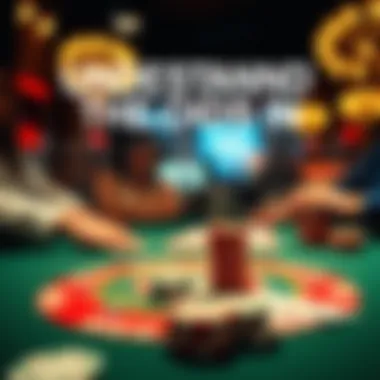
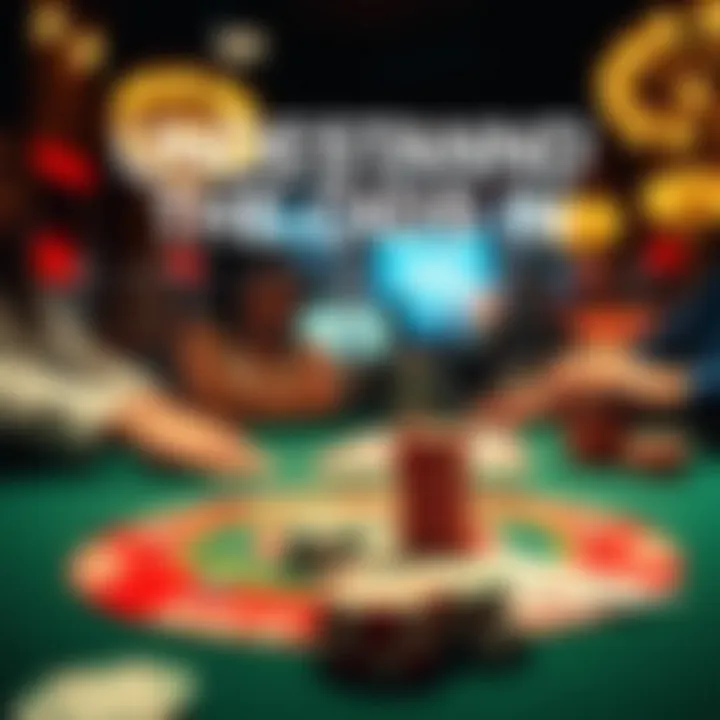
Intro
In the world of card games, few are as captivating as blackjack, a game that has fascinated players for centuries. The appeal lies not just in the thrill of drawng cards or the blending of luck and skill, but also in the intricate dance of probabilities that define every decision made at the table. Understanding the winning odds in blackjack is more than just a helpful statistic; it’s the very backbone of strategy that can dictate whether the night ends in triumph or defeat.
New players often find themselves overwhelmed by the many facets of the game, especially when it comes to the odds of winning. The house always has an edge, but knowing how to level the playing field can differentiate an experienced player from a novice. As the saying goes, "knowledge is power," and this rings particularly true in blackjack. This article will explore the complex web of mathematical principles that undergird this iconic game, offering insight into strategies that can enhance one's gameplay.
Keep in mind, the strategies aren't just for the big spenders, either. Casual players will find value here as well, allowing them to enjoy the game more fully. Deciding whether to split or double down can feel like a daunting task, yet with the right understanding of odds and their implications, these decisions can be made with confidence.
The following sections will dive deep into:
- The various betting strategies that can be employed.
- Essential poker techniques, both for newcomers and seasoned participants.
- How house rules can affect the odds players face at differing tables.
By examining these aspects thoroughly, we aim to provide both an analytical lens through which to view the game while also arming players with the tools they need for improved decision-making, whether you’re blowing off steam at a local casino or strategizing in a competitive tournament. Let's shuffle the deck and get started.
Understanding Blackjack Basics
When it comes to tackling the complexities of blackjack, getting a grip on the basics is crucial. Before dabbling into the minutiae of strategies or the probability of winning, one needs to understand what blackjack fundamentally is and how the game unfolds. This isn’t just line fluff; it’s about carving a solid foundation that supports better decision-making and strategy development as you progress.
The Structure of the Game
Blackjack is played between one or more players and a dealer. The aim here is straightforward: beat the dealer by having a hand value closer to 21 without going over. The game's structure is based on a standard deck of cards. In fact, the typical game uses one or more standard 52-card decks. The values assigned to the cards are crucial:
- Number cards (2-10): Worth face value.
- Face cards (Kings, Queens, Jacks): Each scores 10 points.
- Aces: Can be worth either 1 or 11 points, depending on what benefits the hand most.
This setup lays the groundwork for understanding the various scenarios players will encounter during a game. It’s not just about the cards you hold; it also involves assessing the dealer’s up card and figuring out the optimal play based on current hands and the deck composition.
Objective of Blackjack
The fundamental goal in blackjack is elegantly simple: achieve a total card sum of 21 or as close to it as possible without exceeding that number. But the nuances come into play when you consider that it’s not only about your cards but how they stack up against the dealer’s hand. Let’s break this down:
- Beat the Dealer: To win, your total must either be higher than the dealer’s hand or the dealer must bust (exceed 21).
- Understand Busts: A bust is when your hand goes over 21. Anything over that number is an automatic loss, which is why players must tread carefully.
- Strategic Choices: Players can choose to hit (take another card) or stand (keep their current hand). Understanding when to do this can be the difference between winning and losing.
The objective of the game is not just about the personal hand value but also constantly being aware of the dealer's face-up card. The strategies and choices you make can significantly alter your odds and have a ripple effect on the overall outcome of the game.
By establishing a solid understanding of the game’s structure and objectives, players can start developing strategies that utilize both math and psychological insights. In blackjack, knowledge is power, and it all begins with these foundational elements.
Mathematical Foundations of Blackjack
Understanding the mathematical foundations of blackjack is crucial for any player who wants to enhance their chances of winning. This section delves into the statistical elements that form the backbone of the game, allowing players to make informed decisions at the table. The value of grasping these concepts cannot be overstated; they essentially light the path for both novice and experienced gamblers alike.
Probability Theory in Gambling
Probability theory plays a pivotal role in any gambling game, and blackjack is no exception. At its core, probability is the study of uncertainty and the likelihood of different outcomes. In blackjack, players constantly evaluate their chances of getting the cards they need versus the dealer’s potential hand. Here are some fundamental aspects to consider:
- Basic Probabilities: The likelihood of drawing certain cards can change the entire course of the game. For instance, if you’re holding a total of 16, knowing the probability of pulling a ten can guide whether to hit or stand.
- Combinatorial Analysis: This refers to the different ways cards can combine to form hands. Understanding these combinations can help players assess the risk of busting against the dealer's upcard.
- Shuffling Dynamics: The deck’s composition also influences probability. A fresh deck will yield different odds compared to a shuffled one, particularly in multi-deck games, impacting a player’s strategy.
Understanding these probabilities allows players to take calculated risks, turning a game of chance into one of skill—from knowing when to double down to identifying when the odds favor a split.
Expected Value Calculations
Expected value (EV) is another critical mathematical concept that players should familiarize themselves with. It’s a way to quantify how beneficial a particular bet may be in the long run. In essence, the EV gives insight into whether a decision is a wise move or a gamble based on historical data extrapolated from gameplay. Here’s how you can break that down:
- Positive EV Situations: When players spot a favorable outcome with a high probability of winning, recognizing this can work wonders. For example, if the house edge is lower when the dealer is constrained by specific rules, it may present a prime opportunity for profit.
- Calculating EV: The formula for expected value is simple:[
EV = (Probability of Winning) \times (Amount Won) - (Probability of Losing) \times (Amount Lost)
] - Long-Term Gains: Understanding one's EV can also help in the long term. If player consistently plays positive EV situations, even over a short term, they can find themselves cashing in more frequently than not.
"Mastering expected value is like having a map in a dense forest; it helps you navigate the uncertainties of blackjack more effectively."
In summary, when players incorporate probability theory and expected value calculations into their gameplay, they start to build a robust framework for decision-making. This foundation not only aids in improving winning odds but also enhances the overall experience of playing blackjack.
Winning Odds in Blackjack
Understanding the odds in blackjack is fundamental for anyone looking to enhance their game. The balance between winning and losing hinges on these probabilities, shaping not just the approach you take at the table, but also your long-term success. By grasping the elements of winning odds, players can make better decisions, fine-tune their strategies, and manage their bankroll more effectively. More than just numbers, odds represent the fine line between a casual game and a strategic battle against the dealer.
House Edge Explained
When diving into the world of blackjack, the house edge is a term you’ll hear often. It's a critical concept that illustrates the casino’s inherent advantage over players. This edge is typically around 1% to 2% in blackjack, depending on the rules of the specific game being played. It’s not just an abstract figure; this edge means that, on average, for every $100 bet, the house will retain around $1 to $2 over time.
The house edge varies with factors like:
- The number of decks in play
- Specific house rules
- The strategies employed by players
To trim down this edge, players should familiarize themselves with the optimal strategies. Always aiming to stick with games that offer the fewest rules in favor of the house can be quite beneficial. An example would be choosing a single-deck game over a multi-deck variant since a single deck tends to reduce the house edge.
The house edge is not an inevitable loss—it’s simply a figure representing probabilities. You can work to lessen its bite with informed play.
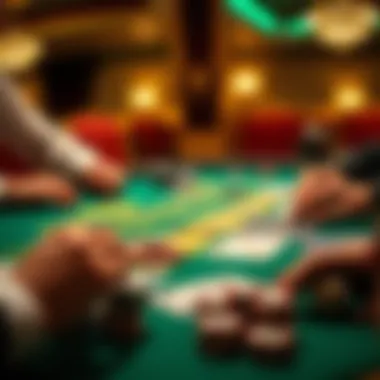
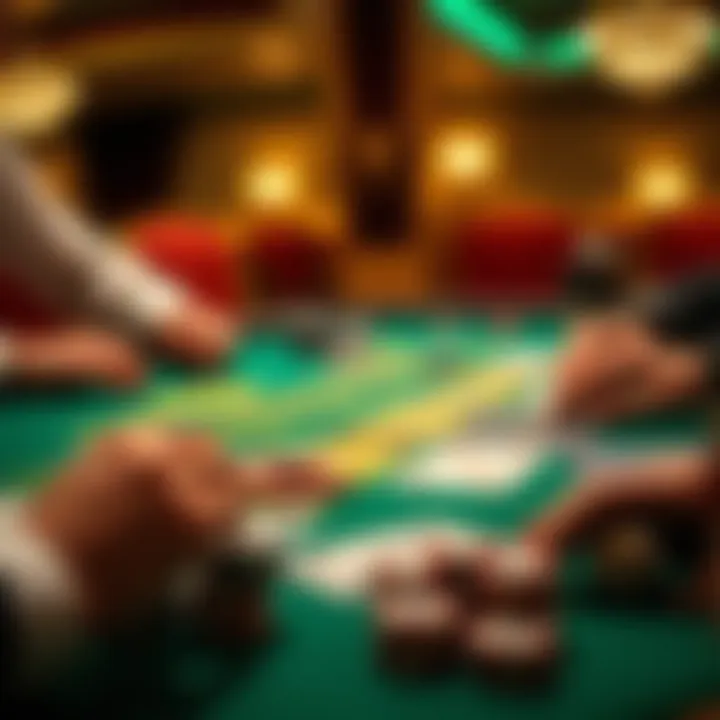
Understanding house rules is equally essential. For instance, rules governing when the dealer must hit or stand can shift the house edge significantly. If players grasp these rules and their implications on winning odds, they can adjust their strategies accordingly, possibly nudging luck in their favor.
Player's Winning Probabilities
Player’s winning probabilities can seem as murky as a foggy day; however, breaking them down can shed light on what must be done to improve the game. Winning probabilities differ based on the player's decisions, the dealer's upcard, and the composition of the remaining cards in the deck. Players generally win roughly 42% of their hands, while they lose around 49%, leaving a narrow margin for ties, which account for about 8%.
Key factors to consider include:
- Dealer's upcard – A dealer showing a 2-6 presents a better opportunity to win. Players should adopt more aggressive strategies against these cards than against higher values, like an Ace, which can result in tougher competition.
- Player's hand value – The more you’re close to 21 without going over, the higher your winning odds become. Knowing when to hit or stand is crucial.
- Basic strategy charts – These provide a roadmap for the best possible moves based on various hand combinations.
To increase your chances further:
- Consider the count of cards remaining in the deck—lesser high cards left can reveal whether to raise or lower your bets.
- Be mindful of when to split pairs or double down; these decisions can dramatically impact your likelihood of winning.
In summary, the odds of winning in blackjack stem from a blend of analytical rigor and strategic gameplay. Whether you’re a novice or experienced player, refining your understanding of these odds can transform your approach to the game, lighting the path to more victories.
Resources for Further Reading:
- Probability Theory in Gambling
- Casino House Edge Statistics
- r/Blackjack on Reddit
- Understanding Blackjack Strategies
Influence of Deck Composition
The composition of the deck in blackjack is pivotal to understanding the game's dynamics. The cards used can significantly change the odds of winning and ultimately impact a player's strategy. When weighing the importance of deck composition, it's essential to consider how the number of decks in play and the specific cards remaining influence gambling outcomes.
Single Deck vs. Multiple Decks
In a single-deck game, players might feel they have an edge, as fewer cards increase the predictability of outcomes. The house edge, in most cases, is lower in these games. For instance, if a player is counting cards, they might have a more precise grasp of the remaining cards, especially when it's just 52 cards to consider. Also, players have a greater chance of hitting a blackjack with a single deck because it often contains more face cards and Aces.
However, casino operators have adopted more multiple-deck games to curb the advantages that players gain through card counting. When three or more decks are shuffled together, the probability becomes less favorable for the player, and the complexity of the game increases.
"With multiple decks, any edge you might have is significantly diluted, making it harder to predict the outcome. The difference can be like comparing apples to oranges."
When contemplating your tactics, think about these factors:
- House Edge Variation: For single-deck blackjack, the house edge can be as low as 0.17%, whereas with multiple decks, it can rise to around 0.65% or more.
- Shuffling Frequency: In a typical casino environment, the more decks in play, the more frequent the shuffling. This often means that players get limited time to utilize card counting effectively.
- Game Variability: Multiple decks can also introduce variability that complicates predicting outcomes, making strategies less reliable.
Card Counting Techniques
Card counting is one of the most talked-about strategies in blackjack, yet it often carries a reputation of being excessively complicated. In reality, card counting is more about keeping a simple tally than employing complex math. This method can give seasoned players an upper hand by providing insights into when the odds are in their favor.
Here are some foundational techniques that can be useful:
- High-Low Strategy: This popular method assigns values to cards—high cards (10s, picture cards, and Aces) are counted as -1, while low cards (2 through 6) are counted as +1. The rest, like 7, 8, and 9, are neutral, meaning they don’t impact your tally. As the game progresses, players keep track of the count, adjusting their bets accordingly based on whether the count is favorable or not.
- True Count Calculation: Understanding how to convert your running count to a true count is essential in a multi-deck game. You do this by dividing your running total by the number of decks remaining. It allows for smarter betting decisions based on actual odds.
- Focus on Player Decisions: Besides just counting cards, being observant about how other players act gives valuable insights into deck composition and upcoming cards.
Incorporating these strategies necessitates practice, patience, and a good dose of discipline. A player who understands the nuances of deck composition has a much higher likelihood of reaping the rewards. Be mindful, though, that casinos often keep a keen eye on players employing these techniques, as they're not particularly fond of anyone gaining an advantage.
As you navigate the world of blackjack, keep these insights about deck composition in mind. Whether you're playing casually with friends or testing your skills at a casino, understanding how the deck impacts your odds can aid in making more educated choices.
Basic Strategy in Blackjack
Understanding the concept of basic strategy is critical for anyone looking to improve their chances at the blackjack table. This strategy represents a set of guidelines that dictate the best course of action based on the player's hand and the dealer's upcard. By following these guidelines, players can minimize the house edge, enhancing their potential for success.
No matter whether a player is a novice or a seasoned gambler, employing basic strategy allows for more rational decision-making during the play. It takes the hunches and whims out of the equation, instead replacing them with calculated approaches that can be easily learned.
Those who grasp this strategy often find themselves experiencing lower losses over time, which is a vital consideration for anyone with a long-term perspective on wagering.
Defining Basic Strategy
Basic strategy can be understood as a collection of mathematical probabilities designed to inform players when to hit, stand, double down, or split pairs. Each move corresponds to a specific situation at the table. For instance, if a player holds a hard 17 and the dealer shows a 10, the basic strategy suggests that standing is the optimal decision. This framework relies heavily on statistical analyses rooted in millions of simulated hand scenarios, providing players with a strategic edge.
One of the pivotal elements of basic strategy is its reliance on the specific number of decks in play. For instance, the chart used for a single deck game might differ slightly from that used in a six-deck game. Familiarizing oneself with the appropriate chart based on the specific rules of the game you are playing is essential. The underlying logic behind basic strategy primarily rests on the consequences of possible outcomes, weighed against the probabilities of winning.
Implementing Basic Strategy
To effectively implement basic strategy, players typically turn to a basic strategy chart, which is easy to access both online and in various literature. The chart presents the optimal play for every possible hand combination against the dealer's possible upcards.
- Start by memorizing the chart: While it may seem daunting at first, frequent practice can help engrain these decisions into your memory.
- Practice with low stakes: Before diving into high-pressure scenarios, use low stakes games or practice apps to familiarize yourself with the moves corresponding to your hands.
- Maintain your composure: Once you sit down at a blackjack table, remember first and foremost to keep your focus on executing the basic strategy rather than allowing emotions to dictate your decisions.
- Adjust to house rules: Keep an eye on the specific rules of the house, such as whether the dealer hits or stands on a soft 17, as this can slightly affect the basic strategy employed.
Following basic strategy consistently can result in reducing the house edge to around 0.5% under optimal conditions.
Mastering basic strategy not only boosts your gameplay but also improves your overall experience at the blackjack table. It lays a solid foundation to build upon as you decide whether to delve into more advanced strategies in the world of blackjack.
Advanced Strategies for Improved Odds
When it comes to blackjack, merely relying on luck can be akin to sailing without a map. The importance of robust strategies cannot be overstated; they can mean the difference between leaving the casino with a smile or a heavy sigh. In this section, we will delve into advanced strategies that can help players improve their odds, focusing on card counting methods and various betting systems that can provide an extra edge.
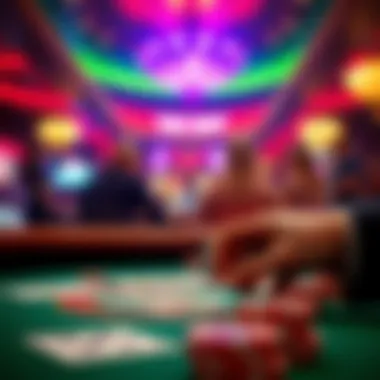
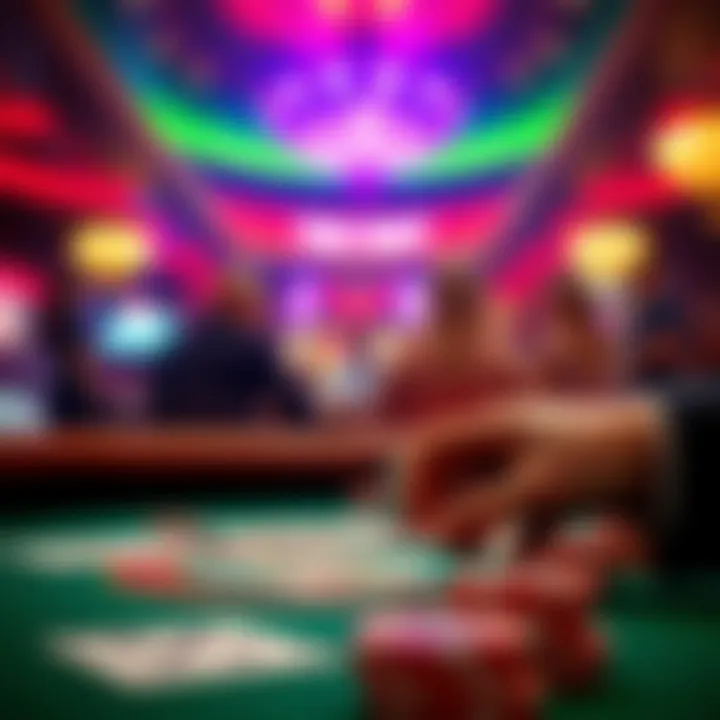
Card Counting Mechanics
Card counting is often portrayed in popular media as a form of sorcery, but in reality, it's a systematic approach to tracking which cards have been dealt. This allows players to gauge the ratio of high cards to low cards left in the deck, thus adjusting their bets accordingly. While it may sound like an elaborate scheme, the principle behind it is fairly straightforward.
One of the simplest methods is the Hi-Lo system. In this method, high cards (10s, face cards, and Aces) are assigned a value of -1, while low cards (2 through 6) are assigned a value of +1. Cards valued at 7, 8, and 9 are considered neutral and get a value of 0. As the dealer flips cards, players keep a running count based on this system, adjusting their bets when the count is high, indicating a deck rich in face cards that favors the player.
"The key to card counting isn’t just memorizing card values but recognizing situational advantages."
However, it’s worth noting that card counting is not a foolproof strategy. It requires significant practice and mental stamina. Moreover, casinos are well aware of this technique and may take steps to counter it, including implementing continuous shuffling machines and banning players suspected of counting cards.
Betting Systems Overview
Improving one's odds in blackjack isn’t solely about counting cards. Betting systems also play a crucial role. These systems can either be progressive or flat, each with its pros and cons.
- Progressive Betting Systems: These systems involve increasing your bet after a win or a loss. The popular Martingale system is a prime example; players double their bet after a loss, hoping to recover all previous losses with a single win. However, this system assumes that players have unlimited funds and the table has no betting limits, which is often not the case in real-life scenarios.
- Flat Betting Systems: In contrast, players stick to a consistent bet, regardless of outcomes. This conservative approach can mitigate losses over time.
- Martingale: Start with a base bet and double it with every loss.
- Paroli: A reverse martingale where you double your bets after wins instead.
- Fixed Bet: Choose a comfortable amount and bet that consistently.
- Unit System: Assign a unit value, using it to dictate your betting amount based on bankroll size.
Both systems require a sound understanding of your limits and a disciplined approach towards gambling. They are tools that can help you manage your bankroll effectively, but they do not change the fundamental odds of the game.
In sum, advanced strategies such as card counting and various betting systems offer significant insights into improving odds. However, players should consider not just the mechanics but also the psychological elements that accompany these methods. It’s a balancing act of math, psychology, and discipline—all crucial for anyone looking to carve a promising path through the alluring yet merciless realm of blackjack.
Impact of House Rules on Winning Odds
Understanding the impact of house rules on winning odds in blackjack is crucial for any player. House rules can significantly alter how the game is played, and by extension, affect the player's chance of winning. Each casino has a unique set of rules that can govern everything from how many decks are in play, to when the dealer must hit or stand. This section explores key variations and how they influence the odds.
Variations in Blackjack Rules
Blackjack is not a one-size-fits-all game; there are numerous variations depending on the casino or even the table at which one plays. Here are some examples:
- Number of Decks: Some games use one deck, while others might use up to eight. Fewer decks often mean better odds for players, as it is easier to track the cards.
- Dealer Stands or Hits on Soft 17: In some places, the dealer is required to hit a soft 17 (an Ace and a 6). This rule generally increases the house edge.
- Doubling Down Restrictions: Some houses limit when a player can double down, for instance, only allowing it on totals of 10 or 11.
- Payout for Blackjack: Standard payout for a natural blackjack is usually 3:2, but some establishments might offer 6:5, which decreases the expected return.
Each of these variations can sway the advantage toward either the house or the player, affecting the odds in significant ways.
How House Rules Affect Odds
House rules don’t just change the flow of the game; they affect the mathematics underpinning winning odds. Understanding these aspects can be a game changer. Here are examples of how specific rules can influence expectations:
- A game with a single deck typically grants a lower house edge of around 0.17%, compared to multi-deck games that might see the house edge rise to above 0.5%.
- If the dealer hits on a soft 17, the house edge could increase by 0.2% or more, impacting the overall profitability for the player.
- Doubling down during favorable conditions can lead to larger wins; hence, knowing the specific to doubling rules can actionably enhance a player's strategy.
- Regularly, players leverage tools like basic strategy charts to navigate these rule variations, ensuring their decisions align with the best mathematical approach based on the house rules in play.
Ultimately, acknowledging how house-specific regulations impact the odds can lead to more informed decisions and potentially enhance players’ success rates at the blackjack table.
In sum, players should scrutinize house rules prior to engaging in a game. Differences that might seem trivial can have far-reaching implications for a player's bottom line. Assessing and adapting as per unique house rules can keep one’s edge sharp at the blackjack tables.
Psychological Aspects of Blackjack
Understanding the psychological factors at play in blackjack is as crucial as mastering the mathematical strategies. Emotions are powerful influences that can sway a player’s performance, leading to decisions that may defy logic or strategy. By grasping these psychological elements, players can not only enhance their gameplay but also learn to mitigate the risks that come with emotional responses. The interplay of mindset, stress management, and the ability to assess risks plays a pivotal role in determining success at the blackjack table.
The Influence of Emotion
In the high-stakes environment of a blackjack game, emotions can run rampant. Whether it’s the thrill of a good hand or the despair from a poor decision, these feelings shape a player's experience. For instance, a player who feels invincible after a few wins might begin taking unnecessary risks, straying from their initially sound strategy. This phenomenon, often referred to as the winner's fallacy, is where confidence morphs into overconfidence, ultimately leading to potential losses.
Conversely, players on a losing streak might experience despair or anxiety, prompting them to chase losses with bigger bets. This behavior, known as loss-chasing, usually results in deeper financial trouble. It’s imperative for gamblers to recognize when their emotions are overtaking rational thought. Practicing mindfulness and maintaining a disciplined approach can help keep these feelings in check.
"Emotions are the silent dealers at the blackjack table; they can shape the outcomes more than the cards themselves."
Risk Assessment in Action
Risk assessment is an integral part of blackjack, blending both cognitive and emotional elements. Players must constantly weigh their options — whether to hit, stand, double down, or split — based on the cards in play and their own psychological state. A sound risk assessment hinges on an understanding of probabilities, but it is often colored by how a player feels.
For instance, a player who feels overly confident might assess a risky hand as advantageous, disregarding statistical probabilities. They might ignore the house edge and instead focus on the adrenaline of potential large payouts. On the flip side, a nervous player may avoid taking calculated risks, sticking too close to a conservative strategy and missing out on opportunities.
To optimize risk assessment:
- Stay grounded: Regularly remind yourself of the odds and probabilities.
- Create a plan: Develop a game plan that outlines your betting strategy, irrespective of emotional responses.
- Pause when necessary: If emotions run high, take a break before making any significant decisions.
By assessing risk with both the mind and awareness of emotions, players can navigate the game with improved clarity. This balance between emotional intelligence and statistical analysis can significantly enhance one’s chances of victory at the blackjack table.
Analyzing Real-World Scenarios
Understanding blackjack through real-world scenarios is a vital part of grasping the nuances of this beloved card game. The concept of real-world scenarios involves translating theoretical knowledge of letters and numbers into actual gambling situations. Players encounter various unpredictabilities, including different opponents, shifting dynamics at the table, or even the psychological tension of high stakes. This application of probability theory and strategies in gameplay reflects a much deeper understanding and adaptability to circumstances.
Real-world scenarios in blackjack are not merely about memorizing strategies or numbers; they are about employing that knowledge flexibly. This realization is pivotal as players often face unexpected challenges and must adjust their tactics accordingly. Moreover, analyzing these scenarios helps refine decision-making in the heat of the moment. Observing patterns, betting behaviors, and opponent tendencies can make or break a session.
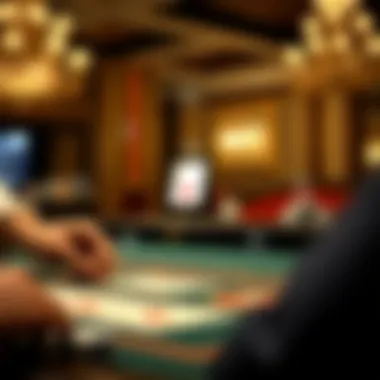

For instance, a player might read their opponents, identifying a tendency to call on lower number hands, thus tailoring their strategy to exploit that weakness.
Case Studies in Gambling
Case studies in gambling offer insight into practical applications of strategies and the probabilities at play. These studies often recount individual experiences in casinos, exhibition matches, or competitive environments. Each case can highlight a distinct facet of gameplay, revealing the effectiveness of certain strategies or the impact of varying house rules.
Take, for example, the case of a professional gambler who meticulously documented every game they played over a year. Their notes captured every hand, every win, and every loss. Upon analyzing these records, they discovered a surprising correlation: certain times of the week yielded higher success rates. This revelation led them to adjust their game nights based on their findings.
Additionally, case studies can showcase the psychological effects of winning and losing streaks. A high-profile tournament might illustrate how pressure affects decision-making, demonstrating how a beginner's enthusiasm can lead to risky bets that seasoned players would not make.
Assessing Success Rates
Measuring success rates in blackjack involves evaluating how effective certain strategies are across various scenarios. A simple calculation could determine the percentage of hands won over a set amount of time or games played, but this only scratches the surface.
Consider a player who predominantly relies on a specific betting strategy. If data reveals that they are winning 70% of their games when using their own learned rules but only 50% when using common betting strategies, they may conclude that their unique method has value. However, it is crucial to assess success rates not just in isolation but as they relate to outside factors.
On a broader scale, a player might utilize statistical methods to compare their results against the known house edge or various game rules. This assessment yields not only an understanding of personal performance but also illuminates how external conditions, like deck composition or player counts, impact the overall odds.
"In the game of blackjack, knowledge is power, but awareness is the ultimate weapon."
For additional reading and resource exploration, consider these links:
- Wikipedia on Blackjack
- Britannica Entry on the Game
- Gamblers’ Forum on Reddit
- Poker Strategy Articles
- Gambling Education Resources
Tools and Resources for Blackjack Players
In the intricate game of blackjack, arming oneself with the right tools and resources can significantly affect a player's chances of success. While understanding the rules and basic strategies is crucial, having supplementary aids can enhance decision-making processes during gameplay, making them invaluable for both beginners and seasoned players alike.
Access to well-crafted tools can translate into more informed choices at the table, potentially turning the odds in favor of the player. The journey through blackjack isn’t just about luck; it’s about combining knowledge with effective resources.
Online Calculators and Software
There’s a wealth of online calculators and software designed specifically for blackjack enthusiasts. These tools serve various functions, from calculating probabilities to optimizing strategy based on real-time game situations. For example, blackjack strategy calculators allow players to input their current hand along with the dealer's card to receive optimal plays based on probability models.
Consider the following benefits of using online tools:
- Immediate Access to Calculations: These tools can process complex calculations in mere seconds, offering insights that could take a player hours to calculate manually.
- Educational Value: Many of these resources also provide explanations of the calculations, thereby enhancing a player's grasp of the game’s mathematical foundations.
- Adaptability: Some software allows for customization, so players can adjust strategies to align with specific house rules or personal preferences.
"Utilizing the right tools can be the difference between a successful session at the blackjack table and one that ends in the red."
Some popular resources include:
- Blackjack Mentors: Websites that focus on strategy sessions and calculators, guiding players step by step.
- Blackjack Wizard: A site that offers a variety of calculators and scenario analyzers to aid players.
- Apps: Various smartphone applications provide quick reference guides and simulated environments for practice.
Books and Literature on Blackjack
Books about blackjack can be a treasure trove of knowledge, providing insight into strategies, histories, and the psychology behind the game. Reading well-respected literature on blackjack can deepen one’s understanding of game mechanics and enhance practical skills. Classics such as "Beat the Dealer" by Edward O. Thorp highlight pivotal strategies like card counting and offer a foundational perspective that remains influential.
Other suggested readings include:
- "Blackjack Strategy: A Card Counter's Tale" by B. H. Lee - This book intricately details the tactics behind successful play.
- "The Blackjack Life" by Nathaniel Tilton - Offers real-life stories and practical advice for aspiring professional gamblers.
Benefits of immersing in this body of literature include:
- Conceptual Understanding: Books break down complex strategies into digestible concepts that can be directly applied at the table.
- Success Stories and Insights: Learning from the experiences of successful players can provide practical tips and inspiration.
- Diverse Perspectives: Literature ranges from mathematical analyses to psychological strategies, offering a well-rounded understanding of various approaches to blackjack.
Finale: Mastering the Odds of Blackjack
Understanding the various facets of blackjack is crucial for anyone looking to refine their skills in this classic card game. The nuances of winning odds tie together mathematical concepts, strategic planning, and psychological readiness, painting a comprehensive picture of what it takes to succeed at the table. By grasping the odds, players can make well-informed decisions that enhance their gameplay experience.
It isn’t merely about luck; skillful manipulation of odds is fundamental. Every choice, such as when to hit or stand, is interconnected with the probabilities that have been meticulously dissected throughout this article. As you’ll recall, strategic knowledge, such as employing basic strategy and recognizing the house edge, forms the backbone of sound decision-making in blackjack. More than just a game of chance, it’s a battleground for strategy and insight.
Key Benefits of Mastering Odds:
- Enhanced Decision-Making: Knowing the odds allows players to make calculated choices that can sway the outcome in their favor.
- Increased Winning Potential: With a grasp of winning probabilities, a player can significantly reduce the house edge.
- Emotional Control: Understanding the math behind game mechanics helps mitigate emotional play, letting logic reign over impulse.
- Adaptive Strategies: As shown in previous sections, various strategies can be honed further through an informed understanding of probability.
Being aware of these elements is integral to moving from a casual player to a more strategic contender. The insights gained serve not just for immediate gains but also enhance long-term engagement with the game. When one learns how to navigate the odds effectively, they become a force at the blackjack table, capable of facing the twists and turns of the game head-on.
Summarizing Key Points
- Winning is About Knowledge: A thorough understanding of the odds and basic strategies forms the foundation of successful gameplay.
- House Edge and Player Equity: Recognizing the interplay of the house advantage and personal winning probabilities can fundamentally shift how one approaches each hand.
- Full Deck Utilization: Varying deck composition changes dynamics. Adapting your strategy based on single versus multiple decks can noticeably alter outcomes.
- Psychological Factors: One’s emotions and thought patterns serve as significant elements that can impact gameplay. Developing mental resilience is just as important as mastering the math.
Future Trends in Blackjack Strategy
As we peer into the horizon, the landscape of blackjack strategies is evolving, influenced by technological advancements, data analytics, and changing player demographics. Here’s what to keep an eye out for in coming years:
- Integration of AI and Machine Learning: Tools that analyze player behaviors and predict outcomes are being developed. This can allow players to better adapt strategies based on real-time data.
- Shift Towards Online Gaming: The rise of online casinos is changing the way players interact with the game. This adaptation demands a fresh look at strategies since virtual platforms can incorporate new rules or variants.
- Behavioral Analysis Tools: As psychological aspects gain more attention, resources to gauge one's emotional responses during gameplay are emerging. Understanding these triggers can lead to improved self-control and decision-making.
- Educational Resources Expansion: The rise in interest in gambling strategies may see more literature and digital content focusing on evidence-based approaches, helping aspiring players learn more effectively.
"Knowledge is power, and in blackjack, it's the difference between winning and losing."
In summary, mastering the odds within blackjack is no small feat, but with dedication and informed strategy, players can elevate their game to new heights. The road ahead for blackjack is filled with opportunities for those willing to adapt and learn in an ever-evolving environment.







